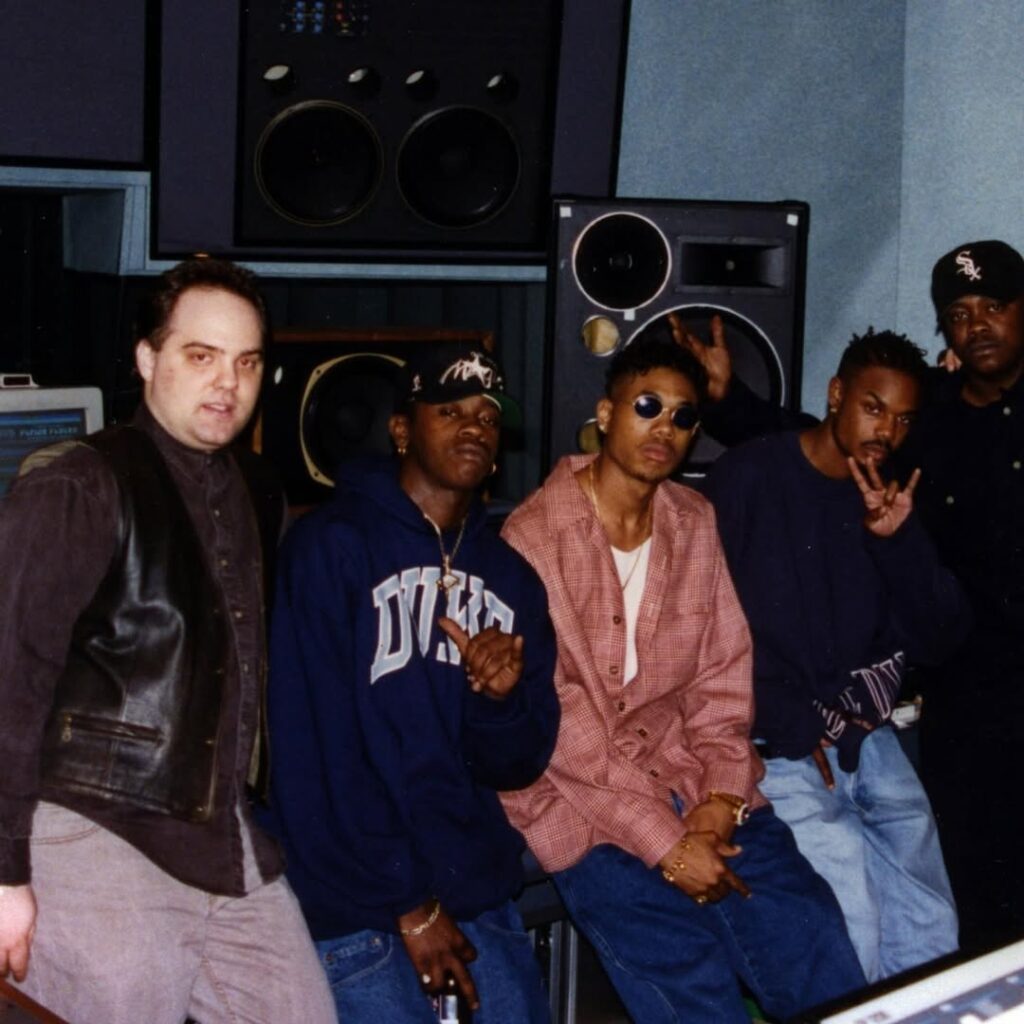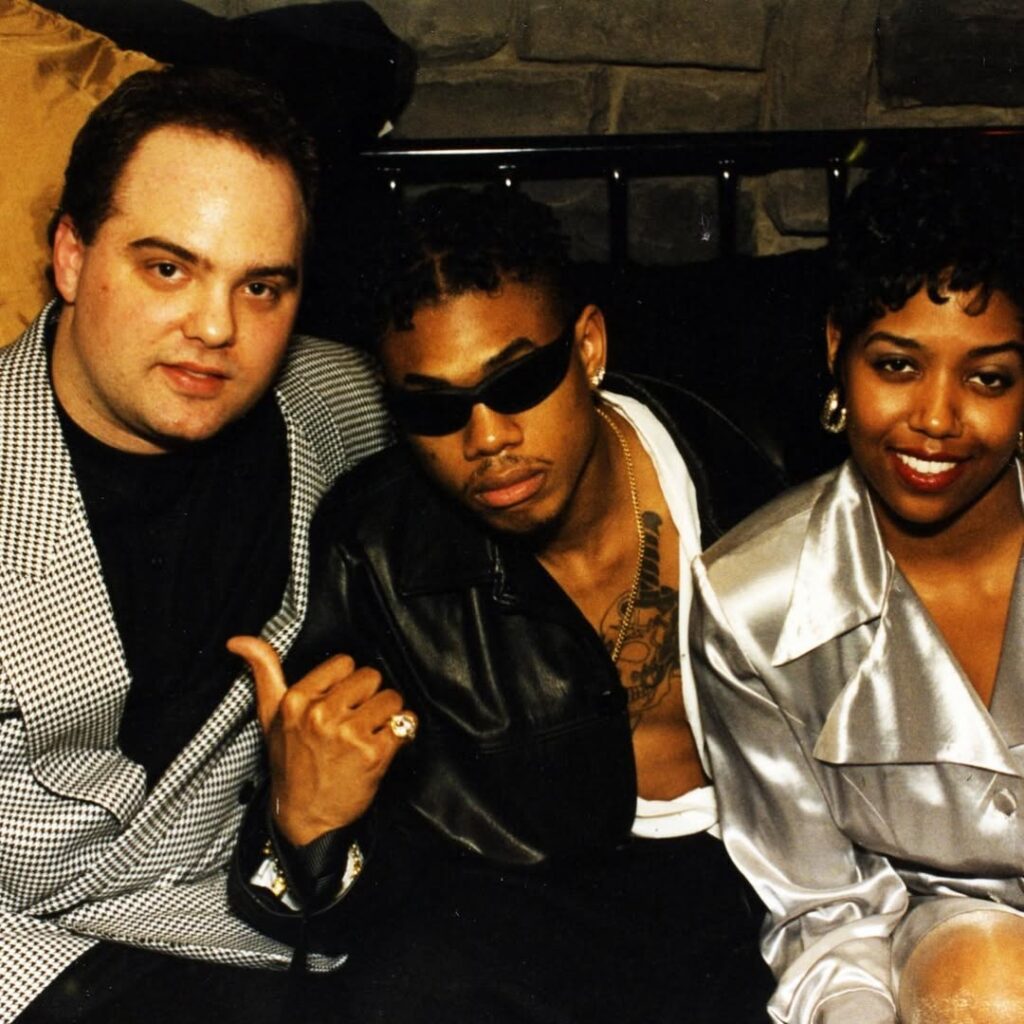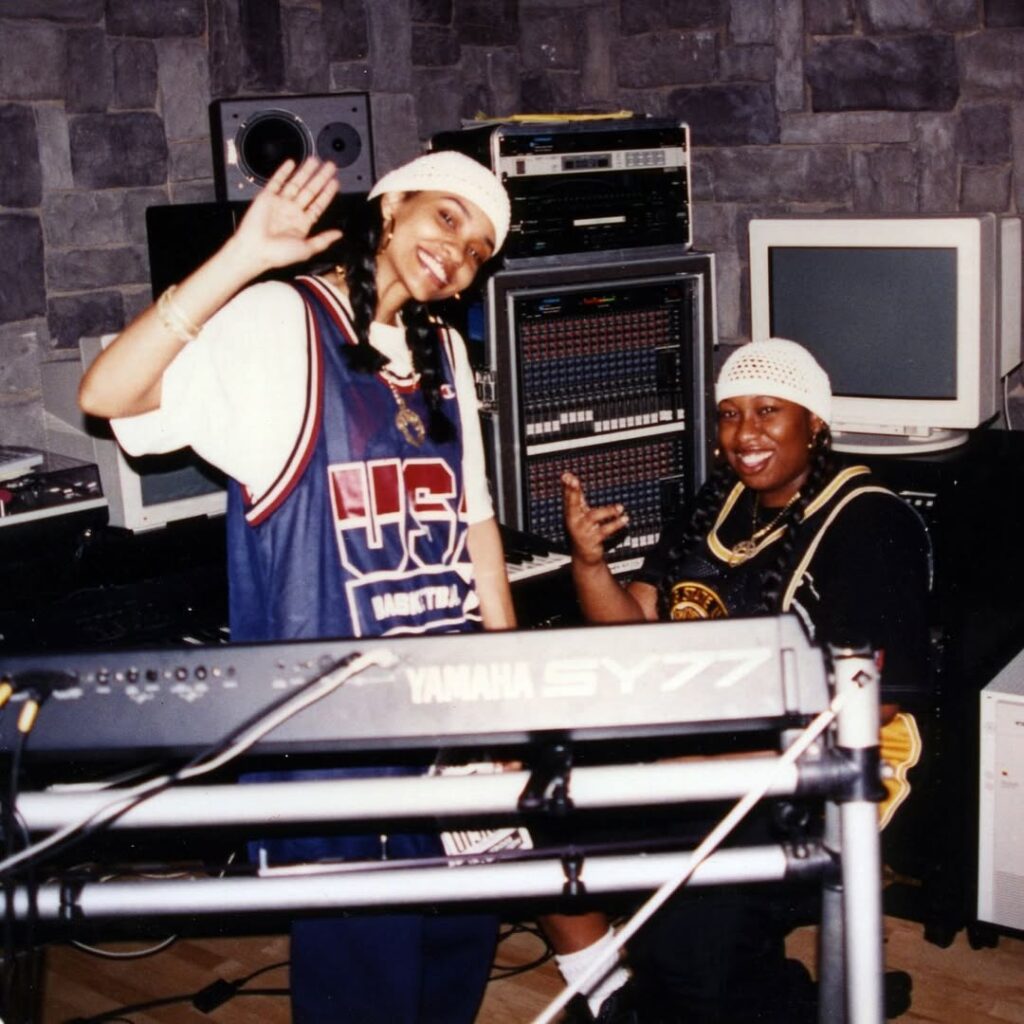Very few days go by where one doesn’t hear the production and writing work of either Missy Elliott, Timbaland, Static Major, or Stevie J on the radio. But a quarter of a century ago, those artists were young unknowns toiling during the nighttime hours under the tutelage of Jodeci’s DeVante Swing at Dajhelon Studios on Rochester’s East Avenue.
Its founder and main partner, Dave Schumaker, had cut Swing a one-of-a-kind deal that allowed him unlimited use of the studio. Things may not have turned out as Swing had planned, but the influence on popular music continues to this day. Dajhelon (pronounced Day-ZHUH-lon) was a state-of-the-art recording studio that competed with studios from New York, Los Angeles, Nashville, and Atlanta and worked with many additional high-profile artists and producers, like Eddie Kramer, Toni Bongiovi, Don Dokken, Bat McGrath, Les Paul, Mary J. Blige, and Dru Hill, in its ten-year time span. The live, Rochester-based syndicated radio program Universal Buzz Radio originated there as Live from Dajhelon.
Beginnings
Schumaker had a precocious entrepreneurial spirit. He began working at twelve in his father’s tire store on East Avenue and mowing lawns. At fourteen he won a youth entrepreneurial grant that allowed him to start a DJ business with his sister Lona and their close friend Jennifer Kremer. They also started a band together that eventually came to be called Dajhelon. Their group aspired to the big time and met with local recording studios, who had a hard time taking them seriously because of their young age.
“We’d go in, talk about recording a demo, and they’d barely give us a tour,” recalls Schumaker. “It was kind of like, ‘Whatever, kid.’” Undaunted, Schumaker, who had saved $20,000 in profits from his childhood jobs and the DJ business ($46,000 in today’s dollars) decided to use that money, formerly earmarked for the recording of their album, to build a studio instead. Schumaker recalls the initial philosophy as “We’re going to start a studio, and we’re never going to treat people the way we were treated. It doesn’t matter your age, what kind of music you’re doing, or your budget. We will take everyone seriously.”
The original studio was set up in the Schumakers’ East Irondequoit basement. With a friend, Sammy Pisano, he drove out to Phoenix to learn the recording business from Pisano’s uncle. Around the time Schumaker graduated from Eastridge High School in 1988, he moved Dajhelon into the basement of Schumaker Tire, a 5,000-square-foot room that had previously been used for tire recapping.
His parents told him, “As long as you don’t disrupt the business, it’s yours.” In one early session in that basement studio, he met the woman who became his wife, Amy, who was part of the Nunda-based gospel group Tribute. Within a couple of years, Dajhelon outgrew the original studio, and Schumaker Tire moved across the street to the former Hallman car dealership (now Spot Coffee), with Dajhelon taking over the rest of the building.
Schumaker is quick to credit friends and family members. In Dajhelon’s early days, several of his close friends, cousin Robert O’Connor, sister Lona, wife Amy, and multiple local investors all helped build the place. Later, Schumaker’s parents even closed their business to head administration at Dajhelon. “It was never just the ‘Dave Show,’” he says.
At a party held at Dajehlon during the Empire Music Conference at the Riverside Convention Center in 1992, however, he met the man who became his mentor, Tony Bongiovi. “I think he got a kick out of me, because I didn’t know who he was and I just talked to him normal. We really hit it off,” says Schumaker. The cousin of Jon Bon Jovi, he started in the music business while still in high school like Schumaker, engineering for Motown.
He would move on to producing and, in 1977, opened a state-of-the-art recording studio in New York called the Power Station. Groundbreaking albums of the 1970s and 1980s were recorded there, including albums by Peter Gabriel, Bruce Springsteen, the Rolling Stones, Madonna, and Cyndi Lauper. Following the conference, Bongiovi visited Schumaker at Dajhelon and declared, “You know what, kid? I’m going to take you under my wing and be my protégé.” Within a few months, Schumaker was staying in Bongiovi’s penthouse, absorbing everything about the recording business at the Power Station NY.
A growth spurt
For a brief time, Dajhelon was known as Power Station Rochester, with the idea that Bongiovi would send the overflow of production work to the Rochester studio. Schumaker and his partners poured hundreds of thousands of dollars into the studio to upgrade it to Power Station standards, but the association wouldn’t last. Bongiovi ran into financial troubles and professionally parted ways with Schumaker and his partners. (In 2017, Bongiovi reacquired the Power Station with help from the Berklee School of Music.)
However, it was through Bongiovi that Schumaker would meet the drummer, songwriter, and producer Reginald “Reggie” Moore, who would shepherd Dajhelon’s most enduring legacy. Schumaker was introduced by Bongiovi to Moore, a Niagara Falls resident. Recalls Schumaker: “‘Oh, you two guys’—[Bongiovi] considered Niagara Falls and Rochester the same place—‘you guys are from the same exact place; you need to work together!’”

Schumaker with the members of Jodeci (photo provided)
At this point, Schumaker had dipped his toe into management and artist development. By 1993, he had twelve artists under contract, and it appeared that one was poised to break out. Schumaker had discovered Renee Anderson through Paul Boutte, a prominent figure in the Rochester gospel scene. A recent graduate of School of the Arts, she’d been in Colorz, an R&B girl group in the vein of En Vogue, SWV, and Xscape (and frequently covered their songs).
“The first time I saw her,” says Schumaker, “I was like, ‘That girl could be a star!” Moore, who’d become a staff producer at Dajhelon, took a liking to Anderson and played her demo for DeVante Swing backstage at the Tonight Show with Jay Leno. Later, Schumaker flew out to Los Angeles and met Swing backstage at the Arsenio Hall Show. Swing then flew to Rochester to meet Anderson and agreed to produce an album for her. “She’s special,” he said of Anderson to the Democrat and Chronicle’s Jeff Spevak in 1995. “She has a distinct sound. And she writes her own stuff. With a lot of artists, you have to write for them. So she’s the complete package.”
The Power Station fallout left Schumaker and his partners with what Schumaker calls “this huge, very expensive machine.” At the time, Swing had several ongoing projects in addition to Anderson’s, and was working in one small studio in Baltimore. Uncertain what to do with it, Schumaker decided to make Swing an offer he couldn’t refuse: he offered Swing all three of his studios with unlimited studio time for six months. “I was giving him a rate for what it was costing him for one studio, and he was getting multiple studios, while covering our overhead” recalls Schumaker. “For what he was trying to accomplish, it worked out perfectly.”
Swing uprooted Jodeci and a gaggle of unknowns he’d signed to his Swing Mob label—among them, Missy Elliott, who was part of the group Sista; Timbaland & Magoo, Ginuwine, Playa, featuring Static Major; and Sugah. After they arrived in Rochester, local talents would join them: producer and former Dajhelon intern Steven Jordan, known as Stevie J; the vocalist Charlene Keys, better known as Tweet, who was recruited into Sugah; and Anderson’s cousin Chandra Bailey, who performed under the name Reboc. Jodeci commenced work on what became The Show, The After Party, The Hotel, and Swing began work on Anderson’s album and a compilation album featuring his young protégés.
Da Bassment Cru
For Anderson, witnessing the recording of The Show, The After Party, The Hotel was a formative experience. “Up until then, I’d only heard the final product from an artist or a celebrity I’d listened to on the radio. To be in an environment and actually see how it happens on a day-to-day basis, it was really cool to see.” Swing installed six eighteen-inch subwoofers in the basement studio that decades ago had been a church vault, and with the incredible amount of bass these speakers created it got nick-named “Da Bassment,” which led Swing’s protégés to be named “Da Bassment Cru.”
Da Bassment Cru was Swing’s Motown, with him in the Berry Gordy role. As Schumaker tells it, the schedules of Swing, Jodeci, and Da Bassment Cru often exasperated the engineers at Dajhelon. “Sometimes, the sessions would get scheduled at 11 a.m. Well, no one would roll in until six o’clock at night, with the engineers having waited since eleven, and they wanted to record all night. It would happen all the time. We would have staff placed around the clock.” It was a complete “party” atmosphere. There was one recording session where, according to Schumaker, “There was literally a Hefty bag brought in filled with weed.” Adds Anderson: “They stayed up all night and partied and slept during the day. Most of the creativity was during the night hours.”

Schumaker, Swing, and Renee Anderson (photo provided)
That’s not to say nobody worked hard. Anderson collaborated with Timbaland on songs and Missy wrote for her as well. “She heard that I was doing a lot of stuff with Tim, and she was like, ‘Okay! I’m just trying to find out where the workers are, and where the chillers are.’ It was a very creative environment. There was a lot of cross-creating within the camp, which is exactly what DeVante wanted. It reminded me of School of the Arts.”
Schumaker remembers Missy Elliott and Timbaland “had a drive about them. It was like they had this vision of what they wanted to achieve,” and adding of Timbaland, “Tim lived and breathed music.” So much so that Timbaland slept on a cot in the studio and would shower in Dajhelon’s upstairs shower. (Most of Da Bassment Cru lived in the Andrews Building, but Anderson recalls them sleeping in the studio often.) Anderson remembers Missy being “the most sober-minded writer. She could hang, but she was all about business and about writing as many songs as she could for the higher possibility of one of her songs being chosen.”
With hits like “Stay,” “Come & Talk to Me,” and “Feenin’,” Jodeci were about as big of an act as one could find in the music business in the mid-1990s. Their arrival in Rochester ushered in a revolving door of celebrity friends, and Schumaker often found himself catering to their whims. One day, Mike Tyson, recently released from prison, took a limo from Manhattan to Rochester. On three hours’ notice, he asked Schumaker if he could get the area’s best restaurant to shut down for them for the night. Schumaker was able to secure a private room at the Rochester Club (now Stromboli’s), although Anderson insists that the restaurant closed for them.
There was also the time when Suge Knight, whose Death Row artist Danny Boy recorded at Dajhelon, called Schumaker from his private jet. Schumaker recalls Knight asking him, “Me and the guys have been working pretty hard, and when we land, want to blow off some steam and have some fun. Can you get us a boat and a dozen Jet-Skis ready for when we land?” “DeVante told me, ‘If anybody could pull it off, you can.’” Despite it being the middle of summer, Schumaker did manage to pull it off, and within a few hours, met Knight at the Newport Marina in Irondequoit.
Other celebrities were more gracious. One evening, Jada Pinkett [Smith], who was dating Jodeci member Mr. Dalvin at the time, visited Dajhelon and cooked what Schumaker remembers as “some awesome fried chicken for everyone.” Madonna, who was rumored to be dating Swing, also paid a visit. According to Schumaker, Swing was seeking a deal for Da Bassment Cru with Madonna’s Maverick record label. Schumaker can’t confirm whether or not Madonna and Swing were dating but says that “they were definitely seeing a lot of each other.”
The Show, The After Party, The Hotel was released on July 18, 1995, reached number two on the Billboard Top 200, and stayed in the Top Ten for several weeks. The extra time it took to complete the recording of the album stalled the recording and completion of Da Bassment Cru album. Swing, Jodeci, and Da Bassment Cru were originally contracted to Dajhelon for six months “If someone ran up a million-dollar studio bill and paid it, most people would let him run it up again. Right?! Well, he ran up a million-dollar studio bill and paid it. So we let him run it up again a second time, but he didn’t pay it. Not that he was trying to do anything wrong.”
Six months turned into a year. Uptown, Jodeci’s record label, decided not to send any more money. According to Anderson, Swing “was off doing deals all the time, and [Da Bassment Cru] were getting discouraged.” Many of the artists were financially dependent on DeVante for food and basic needs, and two of the artists ended up taking things into their own hands: Ginuwine worked at a nearby Foot Locker, and he and the rapper Magoo did yard work for Schumaker at his house in Webster. On one occasion, Ginuwine—or Elgin, as Schumaker knew him—accidentally mowed over a flowerbed that had been planted of flowers from their wedding.

Sista (featuring Missy Elliott, right) (photo provided)
End of an era
Then, according to Anderson, “Somebody went off and got their own deal, and it caused the rest of the artists to look at things differently. It also made DeVante feel a little betrayed. He started looking at everyone else, like, ‘Oh, is that what you want to do?’” Both Schumaker and Anderson say there was no exodus of Da Bassment Cru from Rochester, just a dwindling of members. “That kind of shook everybody up,” remembers Anderson. “Like, this might be a good idea, trying to get my own deal instead of possibly being strung along forever with DeVante’s idea.”
Schumaker had to make a “highly negotiated release” of Anderson’s own Swing-produced album from Interscope, a casualty of a feud between Swing and label head Jimmy Iovine. They subsequently signed to MCA/Universal, but that deal fell through after a staff turnover that led to Anderson being dropped. Anderson recalls being embarrassed over the whole ordeal. “It was totally devastating. I was right here at home, with everybody rooting for me. It was doubly disappointing.”
Schumaker was spending more and more time outside of Rochester, and as he puts it, “some poison crept in” at Dajhelon. He felt that in order for a studio of Dajhelon’s caliber to survive, they would need to focus on artist production and management; his partners didn’t see it that way. “I realized where the industry was going, and it wasn’t about the studio business. I knew the studio we had built to the degree we had built it, the only way to maintain it was to produce our own hit records.” The studio he’d put ten years of his life into had turned into what Schumaker calls “a daily heartache.”
Toward the end of 1997, Schumaker sold his share—then 67 percent—to his partners. Schumaker got to keep the Dajhelon name and insists that the split from his partners was overall an amicable one; unfortunately, the studio closed less than a year later. “I wanted to see them succeed. I wasn’t bitter—I was hurt. There’s a difference.” Schumaker and his wife—who had young children by then—moved to Nashville then Phoenix and worked in artist production and management before getting out of the music business completely. “The music industry was changing rapidly, and I was tired of the drama.”
For the last fifteen years, Schumaker has designed studios and home theaters for a-list celebrities and played matchmaker, pairing products and ideas with potential investors along with building several businesses. Lately, though, Schumaker has been feeling the pull to return to the music business. “Music is in my blood, it always will be,” he says. With Darryl Pearson, former Jodeci guitarist and now multi-platinum producer/songwriter/musician working with the likes of Dru Hill, Beyonce and Michael Jackson, he’s working on a new platform that in his words will “literally be disruptive to the entire industry and the way music is recorded, distributed and monetized.”
According to Schumaker, a-list music artists, producers, and executives have committed to the project and have signed nondisclosure agreements. One act that Schumaker can confirm is part of the project is Renee Anderson and her brother, Nate, who tour as a gospel duo. Anderson continues to work in the music business; she’s worked as a backing vocalist for Kathy Sledge and Michael Bolton, sings commercial jingles, and also continues to record R&B.
Looking back, Schumaker describes Dajhelon as “an adventure” and has no regrets. “It’s something we’ll all remember for the rest of our lives. It impacted us in such a huge way. It really impacted the music world as we know it in a huge way. To have been a part of it is humbling.”
Erin Scherer is an enthusiast of 1990s Hip-Hop and R&B. She lives in Geneva and you can follow her on Twitter at @erinscherer.
This article originally appeared in the November/December 2018 issue of (585).
Views: 298




